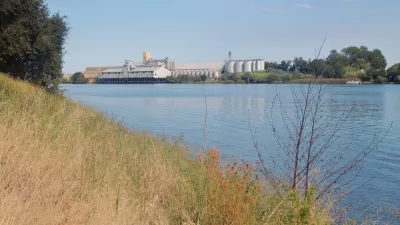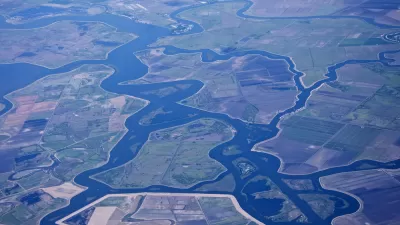The planning process has revealed more modest potential benefits for the highly controversial proposal to spend $15 billion on tunnels to ease environmental strain on the Bay Delta.
Bettina Boxhall reports on the evolution of one of the state of California's most controversial infrastructure projects: a $15-billion diversion and tunnel system in the Bay Delta.
The article reveals an under-reported shift has occurred during the planning process for the tunnel project. According to Boxhall, "as the project has gone through a protracted environmental review by skeptical federal fishery agencies, reality has set in. Instead of cranking open the pumps, the tunnels will, at best, do little more than maintain the status quo."
Boxhall then goes on to detail the benefits of the project, as currently proposed, while referencing the authority of the California Department of Water Resources and U.S. Bureau of Reclamation on the project.
Among the tempered potential of the project, as currently proposed:
- "The tunnels would lessen the damaging reverse flows. But they would not cure the delta's other ecological ailments…"
- The project would not "escape the regulations concerning endangered species and water quality that will probably grow tougher in response to the delta's cascading environmental woes."
- "If the tunnels are built, state modeling indicates future delta exports to the valley's thirsty fields and Southern California's faucets would average 4.9 million acre-feet a year — only a small improvement over recent averages."
The article provides lengthy, in-depth coverage of the project's history, the Delta's ongoing ecological crisis, the state of California's ongoing drought, and the politics surrounding the tunnel project.
FULL STORY: A delta tunnel project's lofty ambitions have been scaled back

Planetizen Federal Action Tracker
A weekly monitor of how Trump’s orders and actions are impacting planners and planning in America.

Congressman Proposes Bill to Rename DC Metro “Trump Train”
The Make Autorail Great Again Act would withhold federal funding to the system until the Washington Metropolitan Area Transit Authority (WMATA), rebrands as the Washington Metropolitan Authority for Greater Access (WMAGA).

The Simple Legislative Tool Transforming Vacant Downtowns
In California, Michigan and Georgia, an easy win is bringing dollars — and delight — back to city centers.

The States Losing Rural Delivery Rooms at an Alarming Pace
In some states, as few as 9% of rural hospitals still deliver babies. As a result, rising pre-term births, no adequate pre-term care and "harrowing" close calls are a growing reality.

The Small South Asian Republic Going all in on EVs
Thanks to one simple policy change less than five years ago, 65% of new cars in this Himalayan country are now electric.

DC Backpedals on Bike Lane Protection, Swaps Barriers for Paint
Citing aesthetic concerns, the city is removing the concrete barriers and flexposts that once separated Arizona Avenue cyclists from motor vehicles.
Urban Design for Planners 1: Software Tools
This six-course series explores essential urban design concepts using open source software and equips planners with the tools they need to participate fully in the urban design process.
Planning for Universal Design
Learn the tools for implementing Universal Design in planning regulations.
Smith Gee Studio
City of Charlotte
City of Camden Redevelopment Agency
City of Astoria
Transportation Research & Education Center (TREC) at Portland State University
US High Speed Rail Association
City of Camden Redevelopment Agency
Municipality of Princeton (NJ)




























